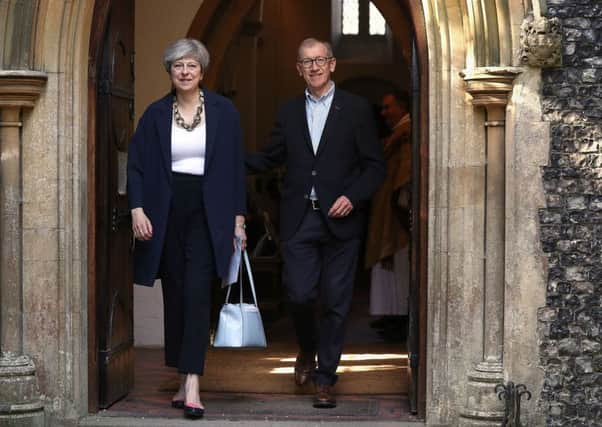YP Comment: Tories: Is May still fit to lead? A question that can't be ducked


If the answer is in the affirmative, the Conservatives need to get on with the job. If not, they need to quickly coalesce around a candidate who can provide the ‘strong and stable’ leadership that Mrs May cannot in these fraught circumstances.
Either way, Britain will not take kindly to a prolonged period of political paralysis, even though the only consensus is that there is no consensus – the country needs to be sending a clear signal to the European Union, and the rest of the world, that the UK is still an outward-looking nation open for business.
Advertisement
Hide AdAdvertisement
Hide AdPerhaps one way forward is for the forthcoming Brexit negotiations to come under the auspices of a cross-party commission that is mandated to act on the Government’s behalf. After all, an overwhelming majority of MPs endorsed legislation to hold the EU referendum a year ago and MPs voted in March in favour of triggering Article 50, the mechanism which formalised the country’s intention to leave the European Union in 2019.
The clock is ticking.
However the fact of the matter is that no leader realistically wants this responsibility after it fell to Mrs May to pick up the pieces after her predecessor David Cameron resigned following a referendum that he never expected to hold and George Osborne, the then Chancellor and now editor of London’s Evening Standard, became the PM’s chief critic.
What chance is there of the Tory party, never mind the country at large, reaching a consensus when a vengeful Mr Osborne likened the Prime Minister, his colleague for six years in government, to “a dead woman walking” rather than showing some remorse for his own culpability over those previous decisions that have culminated with this crisis?
Of course Thursday’s result, and subsequent fallout, needs to be placed in perspective. Labour still lost the election despite Jeremy Corbyn now portraying himself as a Prime Minister-in-waiting. The Tories, meanwhile, did win the most seats, even though this topsy-turvy result feels like a loss to them.
Advertisement
Hide AdAdvertisement
Hide AdAnd while Downing Street jumped the gun when it said, prematurely, that it had agreed a deal with the aforementioned DUP who will essential prop up the May government in return for various assurances yet to be disclosed, this loose arrangement – ‘coalition of chaos’ might be more apt – appears to be the only viable option on the table.
That said, the risks are significant. The DUP’s very conservative social policies on issues like gay marriage threaten to further alienate those students, and young people, who voted for Labour in unforeseen numbers. There also need to be water-tight safeguards that any pact does not compromise the Northern Ireland peace process, especially at a time when Stormont’s power-sharing government is in abeyance because the DUP and Sinn Fein cannot reconcile their deep differences.
If it’s decided that Theresa May is still the politician best placed to be PM, she needs to start asserting her remaining authority as business confidence falters sharply. Time is against her.
Show you care...
EVEN though its callousness towards the elderly and social care was one reason why Theresa May’s election gamble backfired, not least because the so-called ‘dementia tax’ emerged as postal votes were being sent out to pensioners, the Tory party’s initial instincts were, in fact, correct – this issue will only grow in importance because of Britain’s ageing society.
Advertisement
Hide AdAdvertisement
Hide AdThis is borne out by a new survey published to coincide with the advent of Carers Week. Even though unpaid work by UK carers equates to £132bn a year, a sum which is more than double the estimated cost of HS2, eight out of 10 people who have looked after a loved one feel unvalued. With more than 6.5m people currently providing care for an older, disabled or seriously ill loved one, the numbers of unpaid carers is rising faster than the general population and they need far more financial, practical and emotional support than they are receiving at present.
Yet, while the election revealed Britain to be badly divided, this issue transcends society. Without carers, paid or unpaid, the NHS and community care providers would be at breaking point, hence why this is one touchstone issue where all parties should be able to put aside their differences and work on a cross-party basis. Electoral deadlock offers no excuse for not doing so – all politicians need to show that they, too, care about the carers.